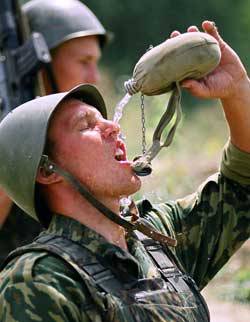Justification for fools
 "It is hard to learn - easy in battle." Here, perhaps, the most popular running covenant by which our Armed Forces were guided and continue to be guided. These words are attributed to Alexander Vasilyevich Suvorov. However, a careful study of the theoretical heritage of the great commander revealed that he did not say anything like that. In fact, the Generalissimo argued that "it is easy to learn - hard to hike, hard to learn - easy to hike." Moreover, it is not entirely clear what the Prince of Italica meant by the term “march” - a march, nomination to a combat area, a battle, a battle, a campaign. The brilliant military thinker in his writings, unfortunately, has never revealed this anywhere. Moreover, the above phrase (“easy to learn is hard to hike, hard to learn is easy to hike”) was first heard not in instructions, orders, instructions and reports of the commander, but in one of his private letters. What is characteristic: in the most important works of Alexander Vasilyevich - "Regimental Institution" and "The Science of Victory" she was not included.
"It is hard to learn - easy in battle." Here, perhaps, the most popular running covenant by which our Armed Forces were guided and continue to be guided. These words are attributed to Alexander Vasilyevich Suvorov. However, a careful study of the theoretical heritage of the great commander revealed that he did not say anything like that. In fact, the Generalissimo argued that "it is easy to learn - hard to hike, hard to learn - easy to hike." Moreover, it is not entirely clear what the Prince of Italica meant by the term “march” - a march, nomination to a combat area, a battle, a battle, a campaign. The brilliant military thinker in his writings, unfortunately, has never revealed this anywhere. Moreover, the above phrase (“easy to learn is hard to hike, hard to learn is easy to hike”) was first heard not in instructions, orders, instructions and reports of the commander, but in one of his private letters. What is characteristic: in the most important works of Alexander Vasilyevich - "Regimental Institution" and "The Science of Victory" she was not included.In his other statements, Suvorov seems to contradict himself, stating that "soldiers love the teaching, if only briefly and sensibly." This, you will agree, does not imply any special burden in organizing combat training. But after a sensible reflection, you come to the following conclusion: classes with fighters should be carefully thought out, organized, conducted within a set time and with proper performance. This is what the legendary winner of the Poles, the Turks and the French had in mind. If, however, the word "march" in the Generalissimo does mean a march training of troops, then here with the words "it is difficult to learn" somehow does not add up very well. Let us turn to the "Science of Victory" (section "Three martial arts"), where so much attention is paid to the redeployment of troops to the intended point. In particular, giving instructions on the plan of the march, the commander concludes: "To this speed, people are not tired." That is, Alexander Vasilyevich was not going to bring the personnel to complete physical exhaustion at such famous Suvorov crossings.
However, it should be noted the following. Everyday life of the Soviet and modern Russian army testifies: the first half of the phrase allegedly pronounced by Suvorov (that the exercise was difficult) is a kind of especially important instruction, which is executed constantly and rigorously. But about the second half - ease in battle, especially in the initial period of any armed conflict - for some reason this does not work out very well. Usually they are not ready for anything, although the "gravity" in the organization of operational and combat training was given paramount attention in peacetime. What is even confirmed by the examples of soldier folklore. Confusion during the lessons there is usually present in abundance, but the ease in battle is not found.
It is not entirely clear why, in principle, it should be without fail in principle. For what reasons? And what, in fact, want to denote this word? Quite explicable fatigue after the fulfillment of all the planned tasks in a timely manner, or the exhaustion of people as a result of the ignorance of commanders who chased them without good or sense? In short, the covenant "hard in learning - easy in battle" must be applied with very, very great care. A sense of proportion is needed here, as probably nowhere else.
Moreover, he is often willingly used by generals and senior officers, whose organizational skills do not correspond to their position. Since the fact that the teaching must necessarily be “heavy”, such “fathers-commanders” tend to write off all the ugliness that usually takes place during maneuvers of various scales. I didn’t feed my staff with hot food after many hours of march - “hard in training”, froze fighters in the field instead of organizing heating - again “hard in training”, did not let anyone sleep for three days instead of rational organization of shift military activities - and again “hard in teaching.
It is well known that units and units will act in a war just as they had previously mastered combat training (and the entire military story confirms that there are no other options and there can not be). If military training in companies, battalions and regiments turned into a test of endurance and survival, then they will not demonstrate any skills on the battlefield. In short, if in peacetime all military wisdom knocked into soldiers and sergeants exclusively "through the ass" and with great difficulty, they will show the corresponding "skill" in the course of the armed struggle. Therefore, a high organization of combat training is still much more preferable than the notorious "hard in training".
Information